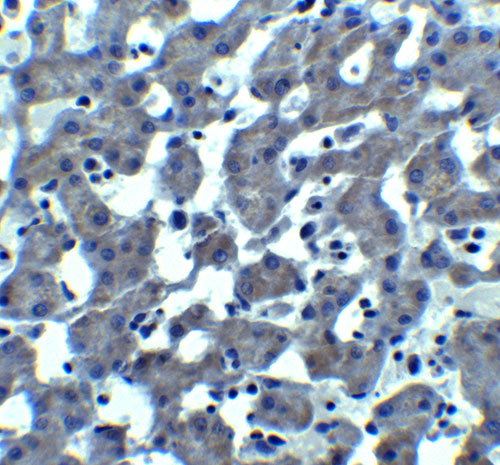Trophinin Antibody
- 产品详情
- 实验流程
- 背景知识
Application
| WB, IHC, E |
|---|---|
| Primary Accession | Q12816 |
| Other Accession | NP_001034794, 89276766 |
| Reactivity | Human, Mouse, Rat |
| Host | Rabbit |
| Clonality | Polyclonal |
| Isotype | IgG |
| Calculated MW | 143716 Da |
| Concentration (mg/ml) | 1 mg/mL |
| Conjugate | Unconjugated |
| Application Notes | Trophinin antibody can be used for detection of Trophinin by Western blot at 1 - 2 µg/ml. Antibody can also be used for immunohistochemistry at 10 µg/ml. |
| Gene ID | 7216 |
|---|---|
| Other Names | Trophinin, MAGE-D3 antigen, TRO, KIAA1114, MAGED3 |
| Target/Specificity | TRO; Trophinin antibody is human, mouse and rat reactive. Multiple isoforms of Trophinin are known to exist. |
| Reconstitution & Storage | Trophinin antibody can be stored at 4℃ for three months and -20℃, stable for up to one year. |
| Precautions | Trophinin Antibody is for research use only and not for use in diagnostic or therapeutic procedures. |
| Name | TRO |
|---|---|
| Synonyms | KIAA1114, MAGED3 |
| Function | Could be involved with bystin and tastin in a cell adhesion molecule complex that mediates an initial attachment of the blastocyst to uterine epithelial cells at the time of the embryo implantation. Directly responsible for homophilic cell adhesion. |
| Tissue Location | Strong expression at implantation sites. Found in the placenta from the sixth week of pregnancy. Was localized in the cytoplasm of the syncytiotrophoblast in the chorionic villi and in endometrial decidual cells at the uteroplacental interface. After week 10, the level decreased and then disappeared from placental villi. Also found in macrophages |
For Research Use Only. Not For Use In Diagnostic Procedures.
Provided below are standard protocols that you may find useful for product applications.
BACKGROUND
Trophinin, also known as TRO or MAGED3, is an apical cell adhesion molecule that is implicated in the initial attachment during the process of embryo implantation and functions by mediating cell adhesion between trophoblastic and endometrial epithelial cells (1,2). Trophinin is a membrane protein expressed in chorionic villi trophoblasts and in maternal endometrial epithelial cells in an implantation-dependent manner and interacts with Bystin and Tastin, facilitating cell adhesion and embryo implantation (3,4). The induction of Trophinin expression may be a useful method for improving implantation rates and can be a potential diagnostic factor and biomarker for human cancer (4,5).
REFERENCES
Fukuda MN, Sato T, Nakayama J, et al. Trophinin and tastin, a novel cell adhesion molecule complex with potential involvement in embryo implantation. Genes Dev. 1995; 9:1199-210.
Ma L, Yin M, Wu X, et al. Expression of trophinin and bystin identifies distinct cell types in the germinal zones of adult rat brain. Eur. J. Neurosci. 2006; 23:2265-76.
Tamura N, Sugihara K, Akama TO, et al. Trophinin-mediated cell adhesion induces apoptosis of human endometrial epithelial cells through PKC-d. Cell Cycle 2011; 10:135-43.
Chen KY, Lee YC, Lai JM, et al. Identification of trophinin as an enhancer for cell invasion and a prognostic factor for early stage lung cancer. Eur. J. Cancer. 2007; 43:782-90.
终于等到您。ABCEPTA(百远生物)抗体产品。
点击下方“我要评价 ”按钮提交您的反馈信息,您的反馈和评价是我们最宝贵的财富之一,
我们将在1-3个工作日内处理您的反馈信息。
如有疑问,联系:0512-88856768 tech-china@abcepta.com.























 癌症的基本特征包括细胞增殖、血管生成、迁移、凋亡逃避机制和细胞永生等。找到癌症发生过程中这些通路的关键标记物和对应的抗体用于检测至关重要。
癌症的基本特征包括细胞增殖、血管生成、迁移、凋亡逃避机制和细胞永生等。找到癌症发生过程中这些通路的关键标记物和对应的抗体用于检测至关重要。 为您推荐一个泛素化位点预测神器——泛素化分析工具,可以为您的蛋白的泛素化位点作出预测和评分。
为您推荐一个泛素化位点预测神器——泛素化分析工具,可以为您的蛋白的泛素化位点作出预测和评分。 细胞自噬受体图形绘图工具为你的蛋白的细胞受体结合位点作出预测和评分,识别结合到自噬通路中的蛋白是非常重要的,便于让我们理解自噬在正常生理、病理过程中的作用,如发育、细胞分化、神经退化性疾病、压力条件下、感染和癌症。
细胞自噬受体图形绘图工具为你的蛋白的细胞受体结合位点作出预测和评分,识别结合到自噬通路中的蛋白是非常重要的,便于让我们理解自噬在正常生理、病理过程中的作用,如发育、细胞分化、神经退化性疾病、压力条件下、感染和癌症。







